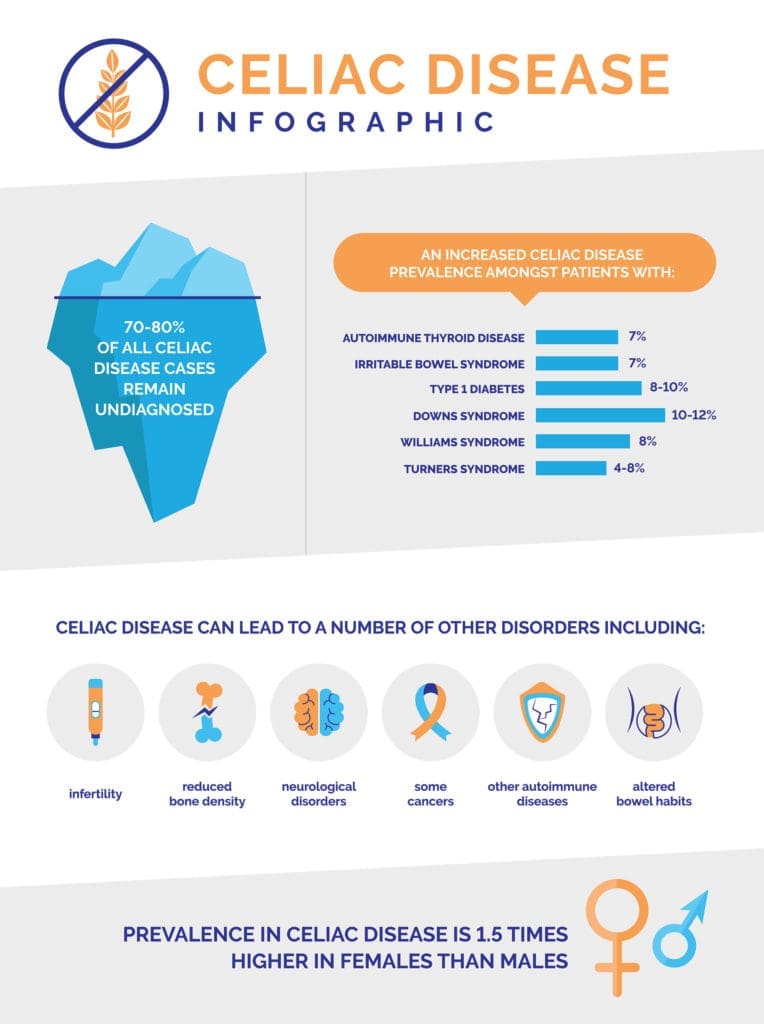Over the last decade, there has been an increasing understanding of the link between infertility and celiac disease. While results have been conflicting at best, a recent study published in the Iranian Journal of Reproductive Medicine examined a mysterious case of infertility in a 26-year-old woman and found that she had undiagnosed celiac disease, which was thought to be the cause of her inability to conceive.
The woman examined in the study had a history of infertility dating back two years and had no other irregularities with her reproductive health. She had previously been referred to a gynecologist for help conceiving and was later found to have celiac disease in an unrelated trip to her general practitioner.
After being diagnosed with celiac disease, her doctors recommended she start a completely gluten-free diet. After three months of her new diet, her gastrointestinal symptoms (mild diarrhea and anemia) subsided, and she was able to conceive.
Cases like this raise the question of whether or not women should be screened for celiac disease before having children.
What is Celiac Disease?
 Celiac disease is an autoimmune disease that causes a person to have difficulty digesting gluten, which is found in wheat, barley, and rye. This intolerance of gluten can lead to small intestine damage and can cause long-term health complications if ignored.
Celiac disease is an autoimmune disease that causes a person to have difficulty digesting gluten, which is found in wheat, barley, and rye. This intolerance of gluten can lead to small intestine damage and can cause long-term health complications if ignored.
It’s estimated that nearly 3 million people in the United States suffer from celiac disease. More children suffer from celiac disease than other disorders such as Crohn’s disease, cystic fibrosis, and ulcerative colitis combined.
Celiac disease can occur at any age and does not appear to affect a certain age group or demographic at a higher rate.
The exact cause of celiac disease is unknown, although many scientists believe it to be genetic. This means that a family history of celiac disease can often be helpful in an early diagnosis, which can be extremely helpful in preventing future health issues such as small bowel cancers or coronary heart disease.
It’s estimated that the average person will go 6-10 years before being diagnosed with celiac disease.
What is the Link Between Celiac Disease and Infertility?
 There have been several studies conducted over the last decade, all of which examine the exact link between celiac disease and infertility in both men and women. While these studies can often have conflicting results, there has been recent evidence that there is, in fact, a correlation between the two.
There have been several studies conducted over the last decade, all of which examine the exact link between celiac disease and infertility in both men and women. While these studies can often have conflicting results, there has been recent evidence that there is, in fact, a correlation between the two.
Most scientists agree that celiac disease is linked to a number of reproductive health issues in women. A recent study conducted by scientists in Denmark found that cases of undiagnosed celiac disease led to a higher rate of both miscarriages and stillbirth. The study also found that women who were then diagnosed with celiac disease and started a gluten-free diet significantly lowered these risks.
Another study, published in the peer-reviewed journal, Human Reproduction, showed just how critical it is for physicians to consider undiagnosed celiac disease in women with reproductive issues.
The study, led by lead author Louise Grode, Ph.D., examined the medical records of 6,319 women with celiac disease and compared them to the nearly 64,000 women without the condition.
After examination, the study found that when women with celiac disease went undiagnosed, they had 11 more miscarriages per 1,000 pregnancies and nearly 2 more stillbirths per 1,000 pregnancies. Furthermore, in the two years leading up to their diagnosis, women with celiac disease had 25% fewer pregnancies per 1,000.
Celiac disease has no known cure. The only near 100% effective treatment for celiac disease is a gluten-free diet. In most cases, women who had been diagnosed with celiac disease and started a gluten-free diet were able to not only curb their symptoms but also conceive a child.
If you believe you have celiac disease, contact your primary physician to see if you can be tested. An early diagnosis of celiac disease can save you years of discomfort and can help prevent serious health conditions later on in life.
What Questions About Celiac Disease or Infertility Do You Have?
Ask away in the comments section below!
What Topics Should We Cover Next?
Email us at info@painresource.com with your ideas.
Are you on Facebook?

